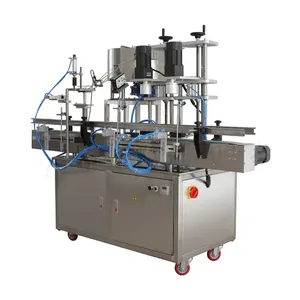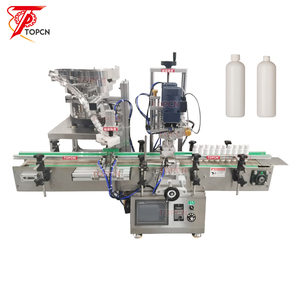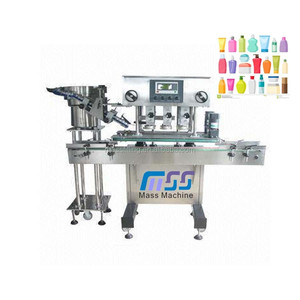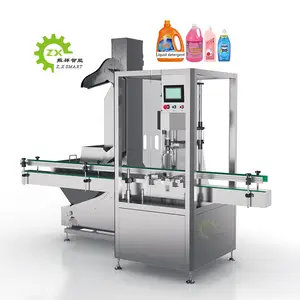(4613 products available)

























































































































































































































An auto bottle cap sealing machine comes in different types to meet various sealing needs. Here are some of them:
These machines use heat and electromagnetic induction to seal the bottle. Electromagnetic induction heats the foil liner, which then melts the polymer coating on the inner side of the cap. The cap is then pressed to the bottle, creating a hermetic seal. Induction sealing machines are suitable for products such as food, pharmaceuticals, and chemicals that require tamper-evident and airtight seals.
They are also known as automatic bottle cappers. These machines apply a threaded cap to the bottle using either a spindle or chuck mechanism. A spindle capper rotates the cap onto the bottle, while a chuck capper applies torque to the cap as the bottle moves through the machine. Screw capping machines are ideal for high-volume production lines that require consistent and tight seals.
Also known as roll-on pilfer-proof cappers, they are designed to apply aluminum caps to glass bottles. An ROPP capper uses a combination of threading and rolling to secure the cap onto the bottle. These machines are commonly used in the beverage and pharmaceutical industries to provide tamper-evident seals.
They are used to apply plastic caps, snap caps, or dispensing pumps to bottles. A press-on capper uses downward pressure to push the cap onto the bottle. These machines are suitable for products such as personal care items, household cleaners, and automotive fluids.
Also known as retorquers, they are used to apply an additional cap or seal over an existing closure. An overcapper places a cap over the bottle and applies torque to secure it in place. These machines are commonly used in industries such as food processing, pharmaceuticals, and chemical manufacturing.
The spindle capping machine is specifically designed for tightening caps onto bottles. It works by using rotating discs (spindles) to twist caps onto bottles. This type of machine is often used in industries such as pharmaceuticals, food, and cosmetics.
When buying an automatic bottle capping machine for business use, it's imperative to consider the following specifications to ensure the chosen machine can meet the production needs and integrate well into the existing production line.
This determines the number of bottles the capping machine can seal within a specific period. It's usually indicated as bottles per minute (BPM). Production capacity varies depending on the model of the capping machine. For example, a fully automatic capping machine can seal up to 1000 BPM, while a semi-automatic machine typically ranges from 20 to 50 BPM.
An automatic capping machine for bottles supports various capping types, including screw capping, snap capping, ROPP capping, and more. The machine's specification should indicate the types of caps it can handle, as well as the cap size range. For instance, an ROPP capping machine may accommodate aluminum caps with a diameter range of 20-38 mm.
An automatic capping machine may be used in various industries, such as food and beverage, pharmaceutical, cosmetic, and more. It is essential to ensure the capping machine is suitable for the intended application. For example, an automatic capping machine for glass bottles is typically designed to cap glass bottles and jars, while an automatic plastic bottle capping machine is optimized for plastic bottles.
Automatic capping machines are sophisticated pieces of equipment that must be well-maintained to ensure optimal performance and longevity. Here are some general maintenance tips.
Wipe down the machine surfaces and cap chutes to avoid dust accumulation. Dust can clog moving parts. Use compressed air to blow out hard-to-reach areas.
Proper lubrication is essential to reduce wear and tear. Lubricate the moving parts and bearings with suitable lubricants as per the manufacturer's instructions. Avoid over-lubricating, as it can attract dust and debris.
Regularly inspect the machine for worn or damaged parts, such as belts, grippers, and sealing heads. Replace them promptly to avoid compromising performance.
Check the machine's settings, such as cap tightness and alignment. Calibrate and make any necessary adjustments to ensure proper sealing.
Follow the manufacturer's recommended maintenance schedule. Schedule professional inspections to ensure all components are in excellent condition and the machine operates at peak performance.
Auto bottle capping sealing machines are widely used in various industries that require the mass production of capped and sealed bottles. Here are some application scenarios for these machines:
Auto bottle capping sealing machines are commonly used in the food and beverage industry to cap and seal bottles of different products. These include beverages, sauces, condiments, oils, and other food products. The machine ensures that these products are sealed properly to maintain freshness, prevent contamination, and prolong their shelf life.
In the pharmaceutical and nutraceutical industries, auto bottle capping sealing machines are used to cap and seal bottles containing medicines, supplements, syrups, and other health products. The machine provides a secure and tamper-evident seal, which is essential for ensuring the integrity and safety of these products.
The chemical and petrochemical industries use auto bottle capping sealing machines to cap and seal bottles containing chemicals, lubricants, detergents, and other products. These machines help prevent leakage, evaporation, and external contamination, ensuring the safety and integrity of the products.
In the cosmetics and personal care industries, auto bottle capping sealing machines are used to cap and seal bottles of perfumes, lotions, creams, shampoos, and other beauty products. The machine ensures that these products are properly sealed to maintain their quality and prevent spoilage.
The agriculture and horticulture industries use auto bottle capping sealing machines to cap and seal bottles containing pesticides, fertilizers, plant hormones, and other agricultural products. These machines help prevent accidental ingestion, spillage, and contamination, ensuring safety during storage and transportation.
When looking to invest in an automatic bottle capping machine for sale, there are a few key factors to consider before making a purchase. First and foremost, it is important to take stock of the needs of the business. Consider the types of bottle caps that need to be placed on bottles and what kinds of bottles are being used. Determine the volume that the machine will be working with. If it is a high volume, then it will be necessary to invest in a machine that can handle that kind of capacity.
It is also important to consider the available space for the machine and the budget that can be allocated for it. Look for a machine that is cost-effective and low-maintenance. Research the different types of machines and make sure to get models that are well-suited for the types of caps and bottles being used. It may be helpful to read reviews from other businesses that are using the same machine.
When making a purchase, it is a good idea to ask questions and get clarity on any concerns about the machine before making the investment. Consider the warranty and after-sales support that is offered by the manufacturer. Finally, it is important to train staff on how to use the machine effectively. Look for a supplier that provides training and ongoing support for the machine.
Q1 What distinguishes the different cap sealing machines?
A1 There are various types of cap sealing machines for different needs and industries. The cap height and diameter determine the size of the capper, while the type of closure and the speed of the capper should also be considered.
Q2 How long will a well-maintained bottle capping machine last?
A2 A properly maintained and well-used capping machine should last more than 10 years. The machine will last longer with proper maintenance and care.
Q3 How should one maintain a bottle capping machine?
A3 Bottle capping machines require regular maintenance to ensure the parts last longer and to maintain optimal performance. Performing scheduled checks and cleaning are the most important maintenance tasks. Keeping the machine clean is important in preventing jams and contaminating products.
Q4 Can a bottle capping machine be adjusted to fit different caps?
A4 Yes, most capping machines have adjustable components to fit different caps and bottles.
Q5 What are the main features to look for in a bottle capping machine?
A5 When looking for a capping machine, consider the type of cap that needs to be used, the type of bottle, the level of automation required and the speed or production volume required.